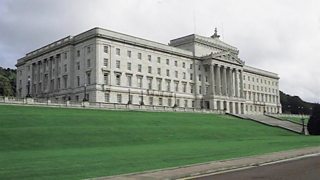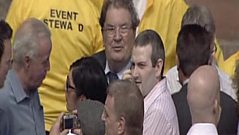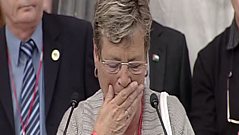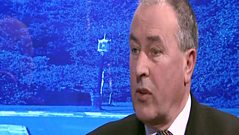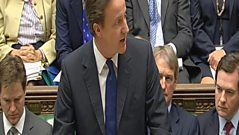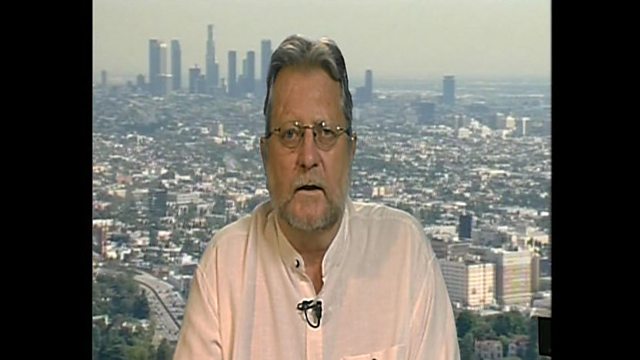
Interview with Tony Clarke
Tony Clarke, a former member of the Parachute Regiment, talks to Jim Fitzpatrick about fellow soldiers’ sceptical attitude towards 1 Para.
Jim Fitzpatrick explains that three weeks after Bloody Sunday (please see context below) the Official Irish Republican Army bombed Aldershot Barracks. The target was the headquarters of the 16th Parachute Regiment. Seven people were killed, none of them soldiers.
Tony Clarke was a paratrooper in Aldershot at the time of the bombing; he later served in Belfast and Crossmaglen. Tony joins Jim from Los Angeles. He states that many of his fellow soldiers were sceptical of news reports that there had been gunmen amongst the civil rights marchers. This scepticism was due to the activities of 1 Para.
Tony says that shortly before Bloody Sunday when the Regiment was stationed at Palace Barracks, Holywood, a group of Paras had robbed a Belfast (see correction below) post office. They were tried, convicted and cashiered (i.e. discharged from the army). One of the four soldiers involved, Costas Georgiou, went on to become the infamous Colonel Callen, a mercenary executed for war crimes by the Angolan government in 1976.
Tony feels that the reputation of the Parachute Regiment as a whole was damaged because of the activities of a few soldiers.
Correction:
The robbery Clarke refers to took place on 18 January 1972 at the Clandeboye Post Office near Bangor. The four accused soldiers appeared before a special court in Bangor two days later and were remanded into military custody until they appeared before the County Court in Downpatrick on 28 February where Wainhouse (22) and Georgiou (21) were sentenced to five years in jail. The other two, John Verbeeck (21) and Stephen Kirby (21) pleaded not guilty and were remanded to appear before the same court on 20 March. The £93 they stole was recovered.
CONTEXT
On 30 January 1972 soldiers from the 1st Parachute Regiment killed 13 innocent civil rights demonstrators in Derry.
The period from August 1971 to January 1972 saw a sustained campaign of anti-internment protests. On 22 January, John Hume led an illegal demonstration along Magilligan Strand just outside Londonderry, towards a nearby internment camp. The marchers were confronted by soldiers of the 1st Parachute Regiment who drove them off the beach using baton charges and rubber bullets.
It was these same paratroopers who were sent into Derry eight days later to deal with another banned protest. This march was organised by the Northern Ireland Civil Rights Association (NICRA). Some ten thousand people gathered in the Creggan estate and proceeded towards Guildhall Square in the centre of the city. The paratroopers had sealed off the approaches to the Square and the march organisers, in order to avoid trouble, led most of the demonstrators towards Free Derry Corner in the Bogside.
Groups of local youths (referred to by the security forces as ‘YDHs’ – Young Derry Hooligans) stayed behind at the Army barricades to confront the soldiers. The soldiers were ordered to move in and arrest as many of the rioters as possible. Just after four o'clock, the paratroopers made their move. What took place next was totally unexpected: the paratroopers opened fire on the crowd, killing thirteen men and injuring thirteen others; one of the injured died some time later.
The soldiers claimed that they had been fired on as they moved in to make arrests. As far as the people of the Bogside and further afield were concerned, the Army had summarily executed thirteen unarmed, innocent civilians. The Widgery Tribunal, which had been set up to investigate the circumstances surrounding the killings, later concluded that: ‘At one end of the scale, some soldiers showed a high degree of responsibility; at the other end.... firing bordered on the reckless’.
The Londonderry Coroner, Major Hubert O'Neill, did not share Lord Widgery's conclusion. At the end of the inquest in 1973, which is still seen by nationalists as a cover up for murder, O'Neill said, “It strikes me that the army ran amok that day and they shot without thinking what they were doing… I say it without reservation - it was sheer unadulterated murder”.
The British government later made out-of-court settlements with the bereaved families
In 1998 the Labour government launched an in-depth investigation chaired by Lord Saville of Newdigate. The Saville Inquiry, which was the most expensive investigation of its kind in the United Kingdom, reported in June 2010.
It concluded that none of the dead posed a threat and the actions of the soldiers were totally without justification. The Prime Minister David Cameron apologised on behalf of the nation for the “unjustified and unjustifiable killings”.
Duration:
This clip is from
More clips from Stormont Live Special - The Saville Inquiry Report
-
![]()
Publication of Saville Report
Duration: 11:42
-
![]()
Relatives of Bloody Sunday victims
Duration: 27:09
-
![]()
Early political reaction to the Saville report
Duration: 09:16
-
![]()
David Cameron responds to the Saville Report
Duration: 14:46
